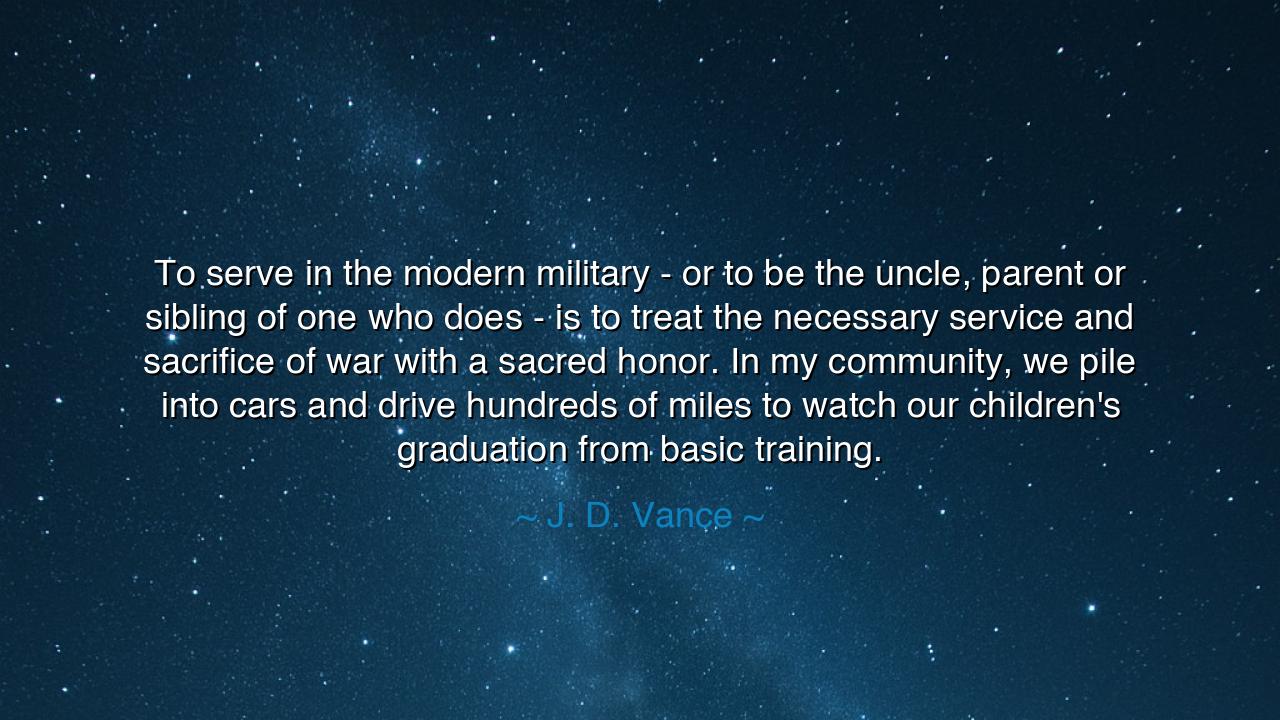
To serve in the modern military - or to be the uncle, parent or
To serve in the modern military - or to be the uncle, parent or sibling of one who does - is to treat the necessary service and sacrifice of war with a sacred honor. In my community, we pile into cars and drive hundreds of miles to watch our children's graduation from basic training.






Hear now the solemn and stirring words of J. D. Vance, who speaks not merely of duty, but of reverence: “To serve in the modern military — or to be the uncle, parent or sibling of one who does — is to treat the necessary service and sacrifice of war with a sacred honor. In my community, we pile into cars and drive hundreds of miles to watch our children’s graduation from basic training.” These are not the words of mere observation; they are the words of remembrance — of a people bound by loyalty, of families who understand that service is not a transaction but a testament. Beneath the humble imagery of travel and graduation lies a truth eternal: that to serve one’s nation is to walk in the footsteps of the ancients, bearing both pride and pain with unwavering devotion.
The meaning of this quote lies in the sacred bond between those who serve and those who love them. Vance reminds us that war, though dreadful, requires not only the strength of soldiers but the steadfast faith of families. To be part of a military community is to share in both the glory and the grief, the triumph and the waiting. It is to understand that the sacrifice of the few sustains the safety of the many, and that behind every uniform stands a circle of hearts bound in quiet courage. When he speaks of families driving “hundreds of miles” to attend a basic training graduation, he speaks of pilgrimage — a journey not merely of distance, but of devotion, where love and pride mingle with the gravity of duty fulfilled.
The origin of these words is found in Vance’s own heritage, shaped by the working-class spirit of Appalachia, a land where community and country intertwine. His people are not strangers to hardship; they have known labor, loss, and endurance. To them, the military represents more than career or honor — it is a continuation of a long tradition of service, a way to stand for something larger than oneself. It is the bridge between the humble home and the vast history of the nation. When Vance speaks of his community gathering to celebrate a graduation from basic training, it is not mere ceremony — it is the reaffirmation of belonging, the acknowledgment that even in small towns, the pulse of patriotism beats strong and true.
Consider, O reader, the story of Spartan mothers, who, as the ancient chroniclers tell us, would hand their sons their shields before battle with the words, “Return with it — or on it.” These women, though hardened by war, were not without love; their courage was of a different kind, the courage to let go. So too does Vance’s community mirror this ancient spirit. When parents send their children to boot camp, when they gather to watch them march in formation, they are witnessing the transformation of their own — from child to guardian, from citizen to soldier. The moment of graduation is both an ending and a beginning, a farewell to innocence and a welcome to responsibility. It is a modern echo of the same devotion that filled the hearts of the ancients.
Vance’s words also reveal something sacred about the act of collective remembrance. In saying “we pile into cars,” he evokes the image of community — of families bound not by wealth or rank, but by shared values and shared journeys. The long roads to military bases, the distant ceremonies under open skies, the tears shed in pride and longing — these are the rituals by which a people remember who they are. They remind us that freedom is not free, that the peace we enjoy is tended by unseen hands and guarded by unseen hearts. The act of witnessing one’s kin become a defender of that peace is no less holy than the act of service itself.
The lesson, then, is twofold: first, that service is never solitary, and second, that honor is not born from comfort but from commitment. To serve, or to love one who serves, is to enter into a sacred covenant — to accept that life’s highest purpose is not ease, but contribution. Whether one wears the uniform or supports from afar, all are part of the same noble endeavor: the preservation of what is good, the defense of what is sacred. The sacrifice of the soldier is visible; the sacrifice of the family, quiet yet no less profound. Together they form the twin pillars of a nation’s endurance.
So, O listener, take these words to heart: when next you see a soldier, or a family gathered in quiet pride, remember that they are the living embodiment of duty and devotion. Honor them not with words alone, but with deeds — with citizenship rooted in gratitude, with a life lived in respect for the freedoms others have secured. And if ever you find yourself driving down long roads to attend a loved one’s graduation from basic training, know that you, too, are part of an ancient story — the story of courage handed down through generations, of love that endures through distance and danger, of a nation kept alive not by comfort, but by sacred honor.






AAdministratorAdministrator
Welcome, honored guests. Please leave a comment, we will respond soon